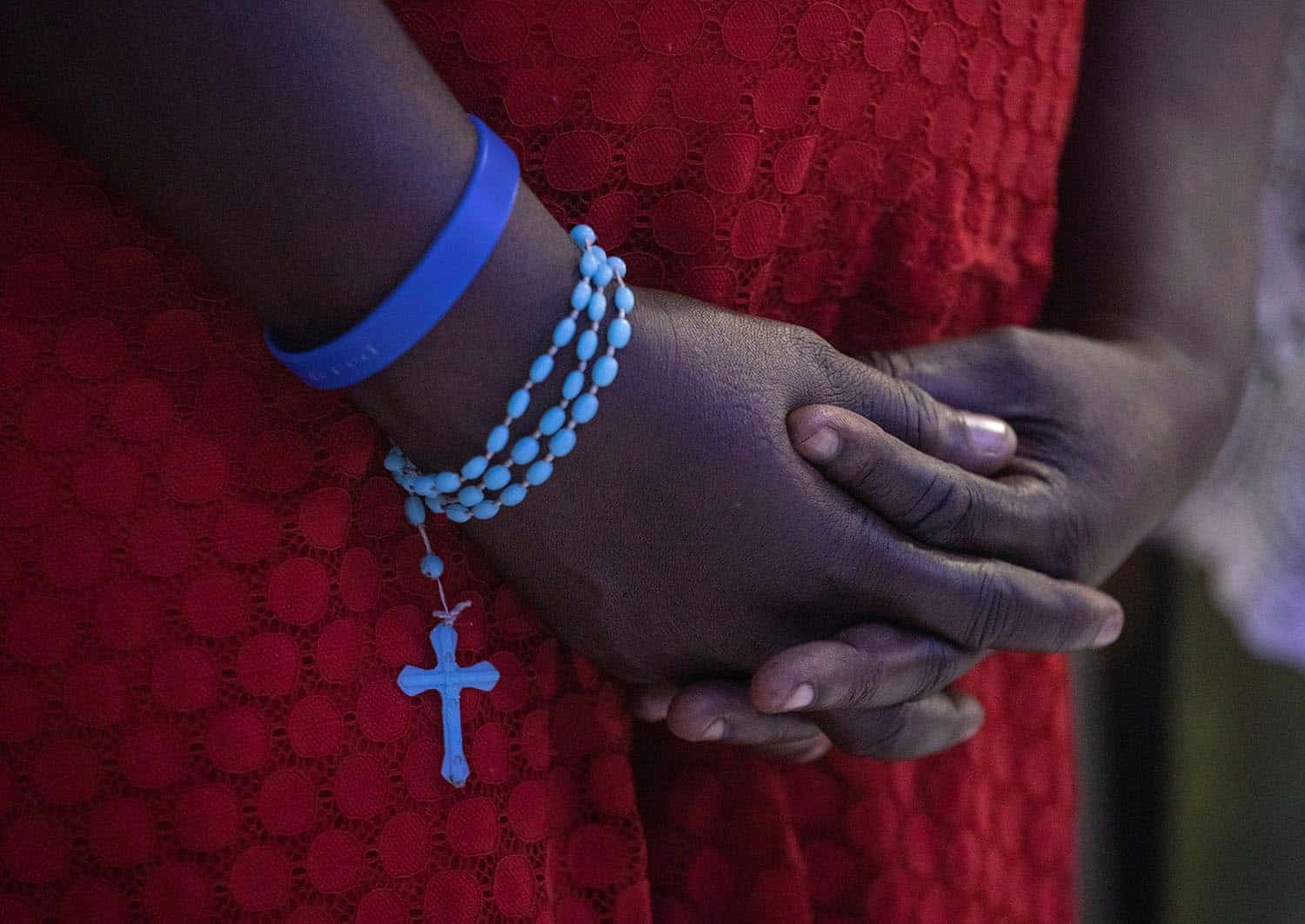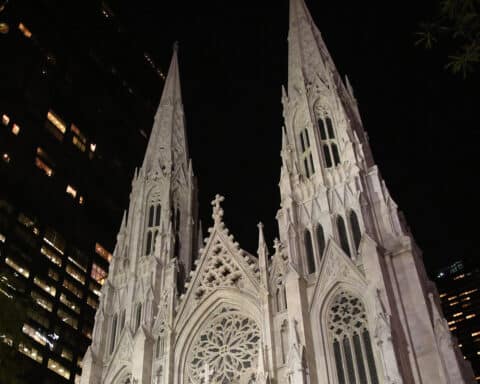SÃO PAULO (OSV News) — The April 1 attack on a Spiritan seminary in Port-au-Prince, Haiti, was the most recent one in a series of incidents involving Catholic Church targets, amid the worst violence crisis in Haiti in several years.
A group of armed criminals invaded the Petit Séminaire Collège Saint Martial, a minor seminary of the Congregation of the Holy Spirit, in the afternoon, and began to set fire to the cars parked in the yard. The four priests who were present in the venue managed to run and hide in a nearby cathedral, along with four employees.
The invaders vandalized several rooms of the seminary, including the administrative offices and the residential area. Electronic devices were stolen or damaged.
Religious suffer amid growing chaos
The Haitian Conference of Religious issued a statement strongly denouncing “the attacks on church institutions, which are being looted and desecrated by heavily armed individuals who attack humble people that do nothing else but serve the entire population, especially the poorest.”
The conference expressed “deep pain” upon the “dizzying situation of chaos in which our beautiful people live today,” adding that it is “with indignation that we note how sons and daughters of the country attack private and state property without scruple and endanger the lives of others who seem to have no value in their eyes.”
The growing chaos in the Caribbean country, where criminal gangs have taken control over large portions of the capital city Port-au-Prince since the killing of President Jovenel Moïse in 2021, has been affecting several segments of society.
Children’s cancer hospital struggles to treat patients
On April 3, Spain’s Fundación Nuestros Pequeños Hermanos (Our Little Brothers Foundation) promoted a press conference in Barcelona in order to call attention to the work of St. Damien children’s hospital, the only one treating child cancer in Haiti. The hospital faces everyday the challenge of selecting the children whose cases can be treated, amid the turmoil caused by the armed gangs in the capital city.
The chronic lack of basic services and public security has been leading more and more Haitians to leave the country.
The crisis in the Caribbean nation, one of the poorest countries in the world, reached its apex on March 11, when Prime Minister Ariel Henry announced his resignation, after at least one week of coordinated attacks on governmental targets waged by criminal organizations.
Haitians flee to other nearby countries
Haitians have been massively migrating to Latin American countries and the United States since the earthquake that devastated the nation in 2010. The economic and social crisis that followed the catastrophe led more and more people to look for work in countries such as Brazil, Chile, and the U.S.
Since 2021, the flux has only increased. At least 158,000 encounters with Haitian nationals have been registered by the U.S. Customs and Border Protection at the Mexican border since December 2022. Additional immigrants got into the country by sea, arriving in Puerto Rico and Florida.
President Joe Biden’s administration has expanded the Temporary Protection Status program for Haitian immigrants, which was first established by the U.S. in 2010. In 2023, 121,000 Haitians were approved for TPS. But the demand is much higher and many immigrants try to enter the country informally. Activists have been demanding the government suspend deportations to Haiti during the current crisis.
“The level of suffering in Haiti for many years has been alarming. The way the situation has evolved and continues to evolve can be described as the most terrible crisis in the entire American continent,” Scalabrinian Father Agler Cherizier told OSV News.
Humanitarian needs abound
Father Cherizier said that besides the insecurity crisis, “there is also a humanitarian crisis that reaches a scale similar to that we usually see in armed conflicts, with more than 3 million Haitians suffering deep humanitarian needs.”
Although the neighboring Dominican Republic has been taking several actions to curtail the Haitian immigration, including the building of a 250-mile wall on the border, the influx of immigrants continues.
“Many Haitian nationals face various types of problems in the Dominican Republic because they are without papers and sometimes, even if they have them, they’re discriminated against, abused, mistreated, stolen and even raped,” Father Cherizier described.
Criminal attacks traumatize citizens
Thirty-one-year old Ashley Pierre arrived in the Dominican Republic before Easter. She’s working on the paperwork and waiting for permission to go to the U.S. as part of the special TPS program for Haitians.
“I cannot find peace in Port-au-Prince. There are so many problems: violence, poverty, unemployment, natural catastrophes,” she told OSV News.
In 2023, her mother was shot in the arm by criminals, an event that traumatized both of them.
“We cannot work and live our lives normally,” she added.
Pierre has a cousin who lives in Miami, where most of the Haitian immigrant community in the U.S. is concentrated.
“I don’t know what kind of work I’ll be able to find there. I just want an opportunity to start again,” she said.
A vulnerable migrant population
Many Haitians have been following other routes. Thousands have been working in South American nations over the past few years, with some having the goal of saving money and heading to North America.
“The Haitian population suffers discrimination and racism in all countries. Their experiences of rejection have been profound in Chile, for example. And along the route (to the U.S.) they are victims of exploitation,” Roy Arias, the coordinator of borders at the Jesuit Migrants Service in Costa Rica, explained to OSV News.
Arias accompanies many immigrants who have just crossed the highly dangerous Darién Gap, a rainforest zone between Colombia and Panama, where people have to deal with the challenges of nature and with criminals. Many of them end up dying during the journey.
Others come by boat through Trinidad and Tobago, facing the risks of the sea.
As soon as they arrive in Panama, they are put into buses and taken to the Costa Rican border.
“Haitians are a group made invisible by the immigration authorities, which means that their particular needs, such as their language, customs and cultural roots, are not attended to,” Arias added.
Bishops call for global attention to crisis
The Latin American church has been calling attention to the Haitian crisis and asking the international community to intervene. The region’s bishops conference, known by the Spanish acronym CELAM, along with the Confederation of Latin American Religious, or CLAR, and the Latin American Caritas issued a pre-Easter letter “All for Haiti” March 22.
The document urged that there are 362,000 displaced in Haiti and 3 million children needing humanitarian help.
“The people from Haiti have been suffering greatly for some time. In recent weeks, the social and humanitarian situation has worsened enormously,” the letter read.
On March 22, bishops of bordering areas in Colombia, Panama, and Costa Rica released a statement after visiting the Darién Vicariate and addressed the growing immigrant crisis, mentioning Haitians among the most significant nationalities crossing the region.
The bishops called the authorities to establish policies to help migrants to integrate and to “break down legal, physical, and symbolic walls of injustice and lack of solidarity.”
Arias pointed out that the church must recognize the Haitians in their specific needs and “open solidarity spaces to welcome them with cultural belonging.”
“And we have to denounce the exploitation they suffer along the route, boosting policies of human rights’ protection,” he concluded.





